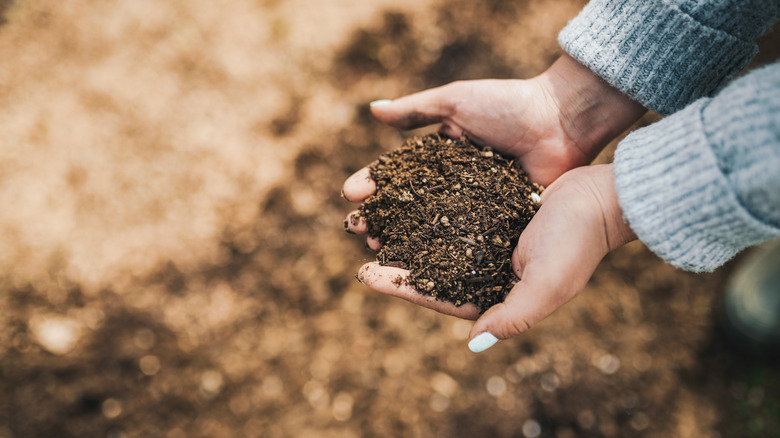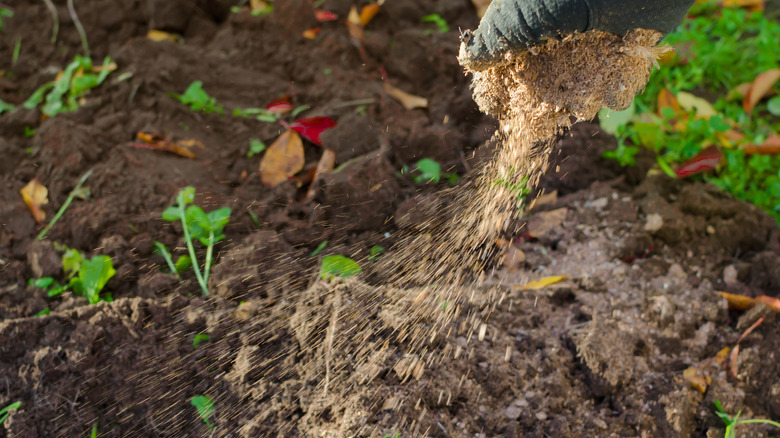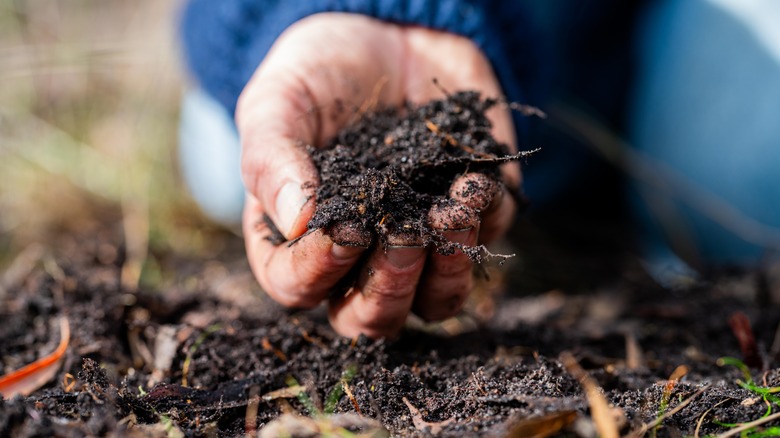The Organic Fertilizer That'll Do Wonders For Your Garden Soil
Although synthetic fertilizers might be a lot cheaper to obtain, chemically-sourced solutions typically don't have as many nutrients to help your garden thrive in the long run. In comparison, organic fertilizers are known for feeding those beneficial microbes and making your soil easier to garden with. Hence, experts say it's the best fertilizer to use for landscaping, and we have a feeling alfalfa meal, in particular, is the solution you've been looking for.
Alfalfa meal originally comes from the alfalfa plant, which has been harvested, fermented, dried into hay, and finely ground. It is a high-protein, high-calcium, grain-free fertilizer rich with all kinds of nutrients that are good for your soil. You can buy alfalfa meal in bags at any of your major local hardware stores, such as Home Depot, Lowes, True Value, and Ace Hardware. This particular fertilizer can completely swap out the current one that you're using, especially if you're looking for something organic that can work as an alternative to typical animal-based nitrogen sources. In return, not only will the alfalfa meal help to feed your plants, but it will also make your garden even more eco-friendly.
Using alfalfa meal as a fertilizer improves the health of your soil
Despite evidence suggesting that the plant has been grown and fed to livestock for thousands of years, alfalfa meal as a natural fertilizer is a practice that dates back only 50 years or so. Alfalfa meal has a well-balanced NPK value, meaning it has a good balance of nitrogen, phosphorous, and potassium; all nutrients good soil needs to thrive. It has a plethora of vitamins and minerals that benefit plant growth, such as vitamins A, B, E, magnesium, iron, and amino acids. This natural fertilizer also contains triacontanol, a hormone that strengthens the root and stem as young plants develop. Thanks to the high nutrient content of the soil, a range of these minerals help to condition the soil and improve its overall structure, including its ability to retain water. This helps attract good bugs, such as earthworms and other microbes, which help aerate the soil.
Plus, alfalfa is known as an eco-friendly source thanks to the way it is grown. This crop can easily be tended to without synthetic fertilizers or pesticides and works well as a natural compost pile booster. You could make your garden even more climate-conscious and grow this crop yourself; growing alfalfa can even help to loosen your soil. It puts down deep roots that aerate and break up clay-like soil, giving you an even more nutrient-rich garden to work with.
Alfalfa meal can repel pests, but attract other critters
Alfalfa meal is high in saponins, a bitter compound that can repel pests from the soil and protect your plants. Studies show that plants like alfalfa produce saponins as a defense mechanism against certain insects, so engraining this into your soil can work as a natural repellant, especially if you're looking to reduce your use of harmful pesticides in the garden. This particular natural fertilizer is also known for controlling harmful nematode populations, aka soil-inhabiting parasites that can cause damage to your cultivated plants.
However, since alfalfa meal is also commonly used as a livestock feed for animals, it could attract certain critters to your garden to eat. Pellet or cubed versions of this soil have acted as feed for rodents such as mice, rats, and rabbits. The best solution to keep critters out of your garden is to use loose alfalfa meal as a top layer to your soil, reducing the risk of finding little field mice among your plants.


